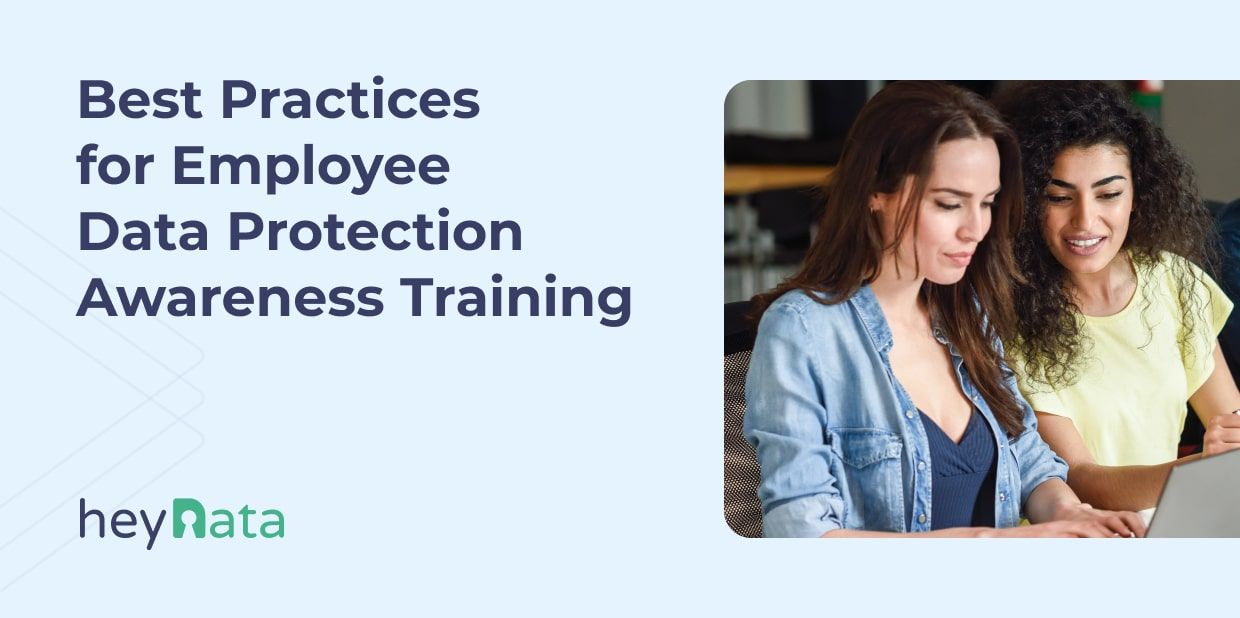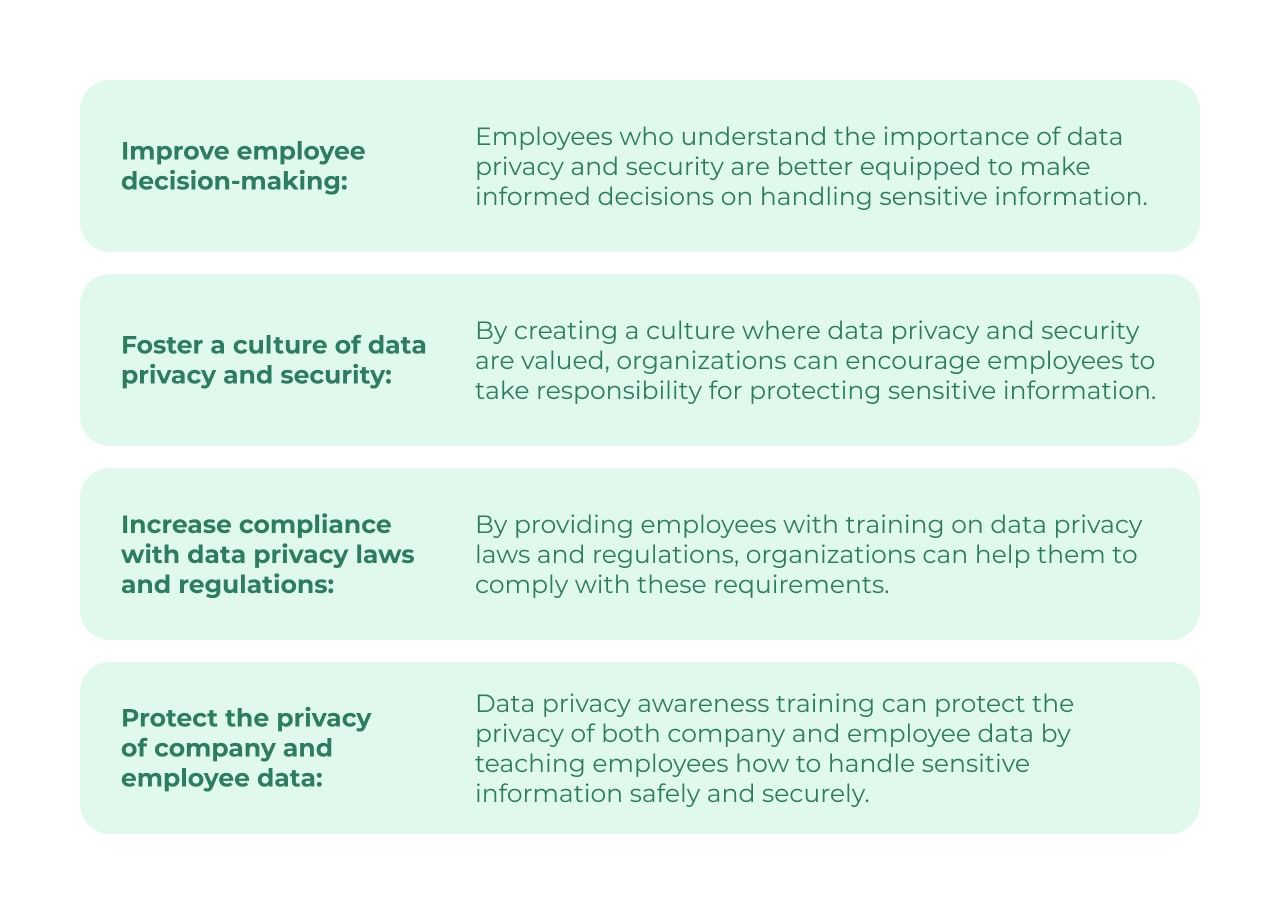
Employee Data Privacy Awareness Training Best Practices

'%3e%3cpath%20d='M26.6667%2020.022L30%2023.3553V26.6886H21.6667V36.6886L20%2038.3553L18.3333%2036.6886V26.6886H10V23.3553L13.3333%2020.022V8.35531H11.6667V5.02197H28.3333V8.35531H26.6667V20.022Z'%20fill='%230AA971'/%3e%3c/g%3e%3c/svg%3e) Unlocking the Value of Employee Data Privacy Training
Unlocking the Value of Employee Data Privacy Training
Learn the best practices for creating effective employee data privacy training. Empower your startup or SMB with knowledge of data protection policies and data security protocols.
In an age where data breaches are becoming increasingly common, startups and SMBs are especially vulnerable. Employees are often the weakest link in an organization's data security chain; thus, it becomes crucial for businesses to invest in data privacy awareness training that educates their workforce on data protection policies, potential risks, and the importance of adhering to security protocols.
Table of Contents:
What Are Employee Data Privacy and Awareness Training?
Data privacy and awareness training is a process of educating employees on the importance of protecting personal data, the risks of data breaches, and the steps they can take to safeguard their personal data. Through data privacy training, businesses can help reduce the risk of data breaches and protect the privacy of their customers, employees, and partners.
Importance of Data Privacy Training
Many companies routinely handle personal data through their IT systems, making it crucial to abide by the GDPR's data protection laws. Empowering employees with comprehensive data privacy training enables businesses to protect their data and steer clear of data breaches, protect their reputations, and avoid regulatory fines. Therefore, businesses that foster a culture centered around placing data privacy first are more capable of safeguarding sensitive information and nurturing trust among their valued stakeholders.
Companies are strongly encouraged to engage with internal or external data protection officers (DPOs) to provide essential data privacy training. DPOs are a valuable and cost-effective resource for companies looking to comply with the GDPR, identify potential data protection risks, and stay up-to-date on the latest data protection regulations.
Related topic: Data protection advice from specialized lawyers
Which department should participate in data privacy training?
Data privacy training is essential for all organizational departments handling personal data, regardless of their size or industry. This extends to departments such as Finance, Marketing, Sales, IT, and Human Resources, all of which are pivotal in safeguarding data privacy. Here are some examples of the significance of data privacy training for each department:
With this in mind, all employees should have a fundamental understanding of data protection laws and participate in basic data privacy training, as they may be involved in processing personal data in their day-to-day tasks. This not only promotes GDPR compliance but also strengthens the organization's commitment to protecting personal data in daily operations.
Benefits of Awareness Training
Data privacy awareness training offers numerous advantages to businesses. It allows employees to grasp the consequences of a data breach while empowering them to safeguard against such risks proactively. Businesses can promote a culture of data protection, establish a risk-free environment for their data, and achieve more benefits of data privacy, such as:

Related topic: All-in-one compliance solution
Employee Data Privacy and Awareness Training Best Practices
With adequate training, employees may fully understand the data privacy risks associated with phishing emails, malware, and cyberattacks. To mitigate these risks effectively, employers should ensure that all employees receive consistent data privacy training regardless of their role or seniority. This training should cover topics such as:
| Importance of data protection and security | Ensure employees understand the importance of protecting sensitive data in their professional and personal lives. They should also be aware of the risks posed by cyberattacks, such as phishing, malware, and ransomware. |
| Identify and report suspicious activity | Train employees to recognize and promptly report any suspicious or unauthorized activity related to data security, helping to mitigate potential breaches. |
| Create and use strong passwords | Educate employees on the importance of creating strong, complex passwords and using secure password management practices to enhance data security. |
| Differences in cyberattacks | Familiarize stakeholders with the various tactics and strategies used in cyberattacks to enable them to identify and respond to different types of threats effectively. |
| Protect personal and work devices from malware | Implement measures to protect personal and work devices from malware, such as using antivirus software and practicing safe online behavior, to prevent data breaches and loss. |
| Regularly assess and reinforce employees' understanding | Conduct periodic assessments and reinforce training with refresher courses or reminders to ensure employees effectively retain and apply their knowledge. |
| Provide ongoing, updated training to adapt to evolving threats | Recognize that the data privacy landscape evolves, and provide continuous, updated training to equip employees with the knowledge and skills needed to address new and emerging threats effectively. |
Consequences of Not Providing Data Privacy Training
Although the failure to provide training cannot be charged with fines, the breaches of data protection resulting from the absence of such training can, according to Boxcrytor. Data breaches can have a devastating impact on organizations, such as financial losses, reputational damage, and legal penalties.
A study by Accenture found that 64% of employees expressed concerns about their data's security due to data privacy scandals. This concern only worsened, especially with the widespread shift to remote or hybrid work arrangements since 2020. More than 50% of remote workers use their personal devices to access work-related data that are not as secure as company-issued devices, causing remote workers to be the target of 67% of cyber attacks, according to Tenable.
Therefore, businesses that fail to train employees on data privacy not only increase their risks of a data breach but also put the privacy of their customers, employees, and partners at risk. Some of the repercussions of organizations failing to implement data privacy training include:
Regulatory Penalties
Neglecting data privacy training can lead to non-compliance with data protection laws and regulations, resulting in organizations facing significant financial penalties and sanctions.
Legal Repercussions
Without proper data privacy training, organizations are more susceptible to data breaches that creates a favorable environment for hackers who can easily exploit the situation to their benefit. This can lead to legal action taken by individuals whose data has been compromised, potentially resulting in costly litigation. In some cases, hackers may resort to blackmailing the company, worsening the potential damage and risks associated with poor data protection measures.
Loss of Customer Trust
Customers may take their business elsewhere if they perceive an organization as not adequately safeguarding their personal information.
Loss of Employee Trust
Organizations that do not demonstrate a commitment to data privacy may encounter reduced employee trust, affecting their willingness to share personal information required for HR and administrative purposes.
Competitive Disadvantage
Businesses that lack data privacy training may lose a competitive edge as clients and partners increasingly prioritize data security when choosing service providers.
Conclusion
Maintaining privacy awareness is crucial for any organization aiming to safeguard its data and the privacy of those it serves. By dedicating resources to privacy awareness training, organizations can effectively lower the chances of data breaches, uphold their reputation, and foster trust among their employees, customers, and partners.


